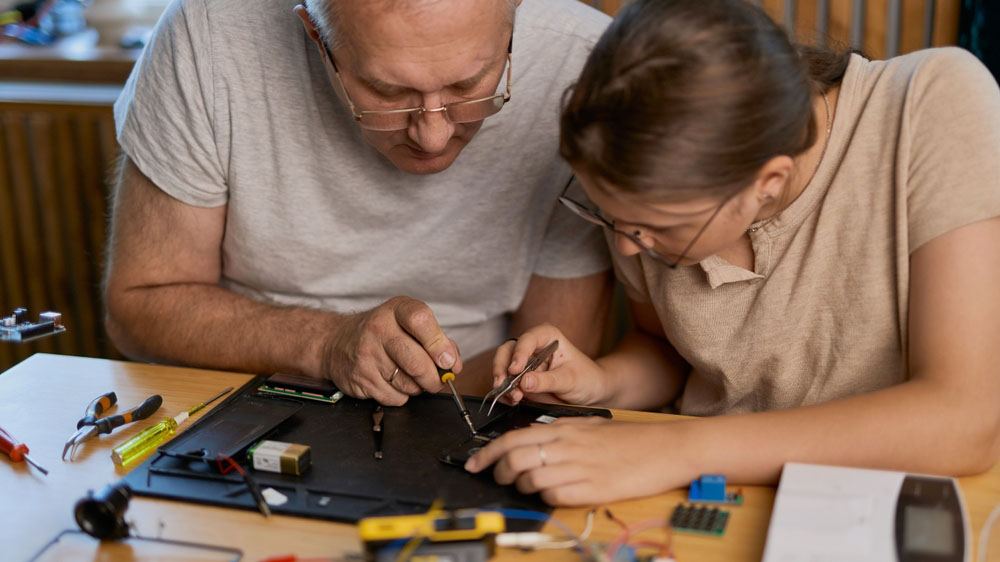Learning Together, Growing Together
In the grand adventure of family life, there’s a treasure often underestimated: the shared project. And when that project becomes educational, it turns into an extraordinary catalyst for bonding, learning, and shared joy. Forget about homework in the corner of the living room accompanied by a resigned sigh—make way for curious exploration, inventive DIY, quirky science experiments, and inspired artistic creations. In short, a vibrant, hands-on, and exciting family education experience.
What if we told you that family educational projects aren’t just for super-organized parents or especially studious kids? That they don’t require a teaching degree or a whiteboard? These projects unfold at a child’s level, driven by shared passions and spontaneous ideas. And above all, they strengthen family bonds more deeply than any Sunday night movie.
🌱 What is a family educational project?
It’s an activity that’s thought up, built, and carried out together—parents, children, sometimes grandparents or visiting friends—around a learning goal. It can be anything from a teaching garden to recording a family podcast, organizing a cultural trip, creating a nature journal, or writing a small neighborhood newspaper.
What matters most is the spirit of cooperation: everyone brings their ideas, skills, and enthusiasm. You learn together, make mistakes, start again, succeed… together. And this kind of experience leaves a much deeper impression than any grammar exercise ever could.
🔍 Why does it work so well?
Because learning is never more powerful than when it’s lived. By getting their hands in the dirt, tinkering, searching, and building, children develop a deep understanding of the world around them. And when adults get involved too, the interactions become rich, nuanced, and rooted in everyday life.
Most of all, these shared educational projects nourish the relationship. They offer quality time, mutual listening, moments of connection… and often, unforgettable memories (yes, even if the papier-mâché volcano exploded all over Grandma’s tablecloth).
🛠️ Some ideas to get started as a family
Here’s a bunch of ideas you can adapt to suit ages, seasons, and current interests:
- Create a learning garden
Plant, water, observe, cook. Learn patience, seasons, and respect for living things… while tasting your own cherry tomatoes. - Build a “home museum”
Each room becomes an exhibit space: choose objects, write explanatory labels, create a guided tour. Culture, creativity, public speaking—check, check, check. - Organize a themed week
Ancient Greece, astronomy, circus arts—anything goes! Read, cook, make costumes, invent games, watch documentaries. A joyful way to dive into a new world. - Launch a science challenge
Build a spaghetti bridge, make an egg float in saltwater, launch a water rocket. Science becomes a playground. - Write and illustrate a book
Everyone contributes: story, drawings, dialogue. You can even print it and give it to relatives. - Produce a radio show or podcast
With a microphone in hand, kids can interview grandparents, record nature sounds, invent jingles. A great way to learn how to structure ideas, ask questions, and speak clearly.
🎯 What are the benefits—for kids (and parents)?
For kids:
- Development of transferable skills: organization, teamwork, public speaking, creativity, independence.
- Self-esteem boost: they feel seen, valued, and competent.
- Natural curiosity is nourished: free from the classroom setting, they ask tons of questions and explore with joy.
- Improved communication with parents, as the project becomes a space for meaningful exchange.
For parents:
- Reconnection with their children outside of routines and obligations.
- Joyful transmission of knowledge, experiences, and values.
- Rediscovery of the pleasure of learning—maybe you’ll fall in love with the solar system or Greek myths all over again.
- Stronger sense of educational confidence: you don’t need to be perfect, just present and engaged.
💡 How to get started smoothly?
Here are a few keys to launch without stress:
- Choose the topic together. Buy-in is essential to get everyone on board.
- Set a flexible framework: establish a timeframe and a few steps, but leave room for spontaneity and excitement.
- Value everyone’s contributions, even the smallest: the little one sticking on labels or the teen composing the theme song in beatbox.
- Celebrate the end of the project: an exhibit, a show, a public reading, a keepsake video. The sense of accomplishment is just as important as the knowledge gained.
- Be kind to yourselves: perfection isn’t the goal—enthusiasm and shared joy are.
💞 And beyond learning?
Family educational projects are a way to experience time differently. To slow down the whirlwind of daily life. To see your children through new eyes, to try new things yourself, to create together—with no pressure or need for perfection.
It’s also a space for emotional expression: there’s wonder, laughter, maybe some frustration, negotiation, compromise. And brick by brick, you build a shared family culture. These rituals become a kind of living memory, an emotional foundation everyone can lean on, long into the future.
👣 In conclusion…
Family educational projects aren’t just another task on the parenting to-do list. They are little pockets of life, tiny and precious adventures that weave invisible threads between family members. In a world that often glorifies speed and individualism, they reaffirm the power of connection, mutual attention, and the joy of learning together.
So—what will your next family project be? A living room theater show? A photo report on neighborhood birds? A giant mural on the garage wall? Whatever you choose—the important thing is to dive in. Together.
📚 En anglais :
- The Benefits of Family Learning Projects – Educational Review (https://www.tandfonline.com/doi/full/10.1080/00131911.2019.1573793)
- Family Involvement in Education: What Works – Harvard Family Research Project (https://archive.globalfrp.org/family-involvement/publications-resources)
- Learning Together at Home: Family Learning Initiatives – The National Literacy Trust (https://literacytrust.org.uk/resources/learning-together-at-home)
- Parental Engagement and Children’s Learning – OECD Education Working Papers (https://www.oecd.org/education/school/48904594.pdf)
- Project-Based Learning in the Family Context – Journal of Family Studies (https://www.tandfonline.com/doi/full/10.1080/13229400.2020.1723021)


